Students of Grade 9, planned to plant saplings along straight lines, parallel to each other to one side of the playground ensuring that they had enough play area. Let us assume that they planted one of the rows of the saplings along the line y = x-4. Let L be the set of all lines which are parallel on the ground and R be a relation on L.
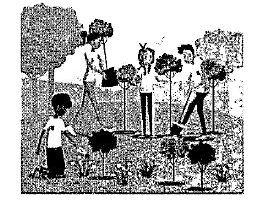
Let relation R be defined by R={(L1,L2):L1)∣∣L2 where L1,L2∈L} then R is ...............
Equivalence
Only reflexive
Not reflexive
Symmetric but not transitive
The correct Answer is:A
Topper's Solved these Questions
- RELATIONS AND FUNCTIONS BOOK - ICSECHAPTER - RELATIONS AND FUNCTIONS EXERCISE - MULTIPLE CHOICE QUESTIONS (ASSERTION AND REASON BASED QUESTIONS)
7 Videos
- QUESTION PAPER-2018BOOK - ICSECHAPTER - QUESTION PAPER-2018EXERCISE - Section -C
8 Videos
- SAMPLE PAPER - 4 BOOK - ICSECHAPTER - SAMPLE PAPER - 4 EXERCISE - Questions (Section C)
8 Videos
Similar Questions
Students of Grade 9, planned to plant saplings along straight lines, parallel to each other to one side of the playground ensuring that they had enough play area. Let us assume that they planted one of the rows of the saplings along the line y=x−4 . Let L be the set of all lines which are parallel on the ground and R be a relation on L.
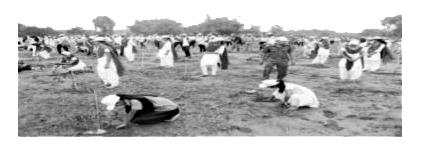
Answer the following using the above information.
Let relation R be defined by R={L1,L2):L1∣∣L2 where L1,L2∈L} then R is ______ relation
View SolutionStudents of Grade 9, planned to plant saplings along straight lines, parallel to each other to one side of the playground ensuring that they had enough play area. Let us assume that they planted one of the rows of the saplings along the liney=x−4. Let L be the set of all lines which are parallel on the ground and R be a relation on L.
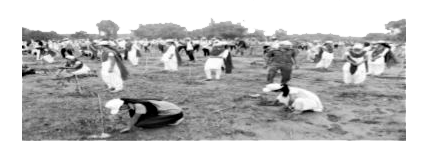
Answer the following using the above information.
Let R={L1,L2):L1⊥L2 where L1,L2∈L} which of the followng is true?
View Solution
Knowledge Check
Let A be a relation on the set of all lines in a plane defined by (l2,l2)∈ R such that l1∣∣l2, the n R is
Areflexive onlyBsymmetric onlyCtransitive onlyDan equivalence relationRelation " parallel" in the set of all straight lines in a plane is :
Aonly reflexiveBonly symmetricConly transitiveDequivalence relation
Students of Grade 9, planned to plant saplings along straight lines, parallel to each other to one side of the playground ensuring that they had enough play area. Let us assume that they planted one of the rows of the saplings along the line y=x−4 . Let L be the set of all lines which are parallel on the ground and R be a relation on L.
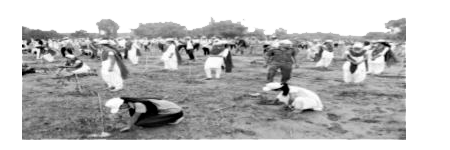
Answer the following using the above information.
The function f:R→R defined by f(x)=x−4 is _______
View SolutionStudents of Grade 9, planned to plant saplings along straight lines, parallel to each other to one side of the playground ensuring that they had enough play area. Let us assume that they planted one of the rows of the saplings along the line y=x−4 . Let L be the set of all lines which are parallel on the ground and R be a relation on L.
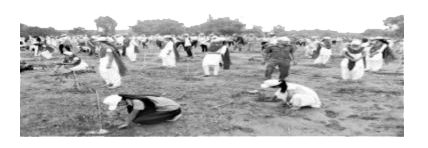
Answer the following using the above information.
Let R={(L1,L2):L1 is parallel to L2 and L1:y=x−4} then which of the following can be taken as L2?
View SolutionStudents of Grade 9, planned to plant saplings along straight lines, parallel to each other to one side of the playground ensuring that they had enough play area. Let us assume that they planted one of the rows of the saplings along the line y=x−4 . Let L be the set of all lines which are parallel on the ground and R be a relation on L.
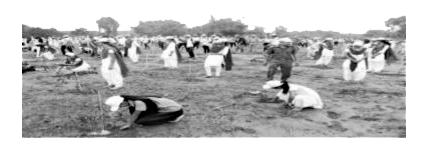
Answer the following using the above information.
Let f:R→R be defined by f(x)=x−4. Then the range of o f(x) is _
View SolutionLet A be the set of all lines in xy-plane and let R be relation in A , defind by
R={(L1,L2):L1∣∣L2}.
show that R is an equivalence relation in A.
Find the set of all lines related to the line Y=3x+5.
View SolutionLet L be the set of all straight lines drawn in a plane, prove that the relation 'is perpendicular to' on L is not transitive.
View SolutionLet L be the set of all lines in a plane and R be the relation in L defined as R={(L1,L2):L1is perpendicular to L2} Show that R is symmetric but neither reflexive nor transitive.
View Solution
